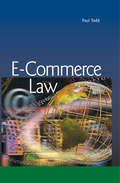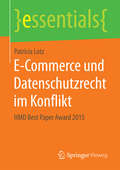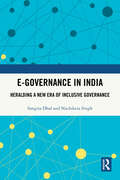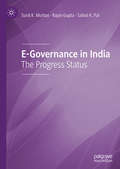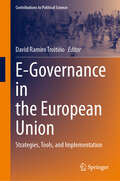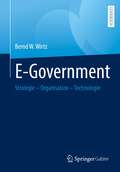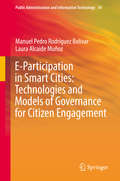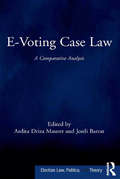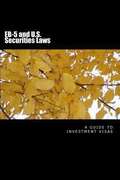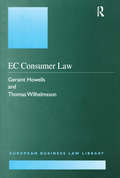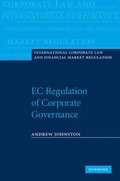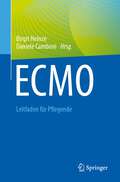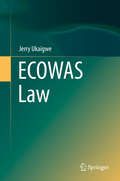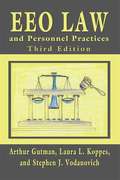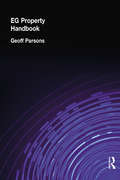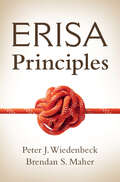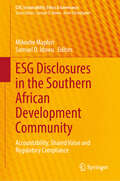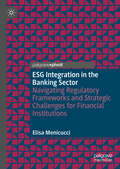- Table View
- List View
E Is for Ethics
by Ian James Corlett R. A. HoltHelping kids think about their earth's future is no easy task. These days, there's a lot of talk about being green, buying organic, and protecting our planet, but making eco-friendly choices can be hard for busy families. Luckily, Ian James Corlett--an award-winning children's TV writer and author of E Is for Ethics--is back with a guide that makes saving the environment a fun family adventure. Best of all, Elliott and Lucy--who made values and morals so accessible in E Is for Ethics--are here to help. In these stories, Elliott and Lucy learn that being good to the environment isn't a big chore--it's actually pretty cool! (And they get to teach Mom and Dad a thing or two along the way.) With this engaging read-together book, families will see that the small things they do every day can make a big impact. Teaching your children about the planet has never been so easy or entertaining--and before you know it, they'll be reminding YOU to recycle!
E-Commerce Law
by Paul ToddThis book includes detailed coverage of intellectual property, contract, encryption and liability issues, including allocation of domain names, use of metatags and other forms of search engine optimization, digital signatures and the position of ISPs and other intermediaries. There are case studies on electronic conveyancing and e-taxation. Though the book is written from a UK perspective, comparative material is included from other jurisdictions, including America and Singapore in particular.
E-Commerce und Datenschutzrecht im Konflikt: HMD Best Paper Award 2015 (essentials)
by Patricia LotzPatricia Lotz behandelt Rechtsfragen zum Einsatz moderner Marketingformen und gibt einen ersten #65533;berblick #65533;ber die Fallstricke, die sich dem E-Commerce in Zukunft vor allem im Bereich des Datenschutzes stellen werden. Die Autorin zeigt gleichzeitig m#65533;gliche L#65533;sungswege auf. Aus rechtlicher Sicht bespricht sie Webtracking, Geolokalisierung und Social Plugins. Zudem gibt sie eine #65533;bersicht #65533;ber die Integration von E-Payment-L#65533;sungen.
E-FOOD: Closing the Online Enforcement Gap in the EU Platform Economy (Studies in European Economic Law and Regulation #21)
by Maria Jose Plana CasadoRetail is ‘going digital,’ and grocery shopping is no exception. While some businesses are relaying on their corporate website to make the sale, both traditional brick-and-mortar and new disruptive business models are increasingly using online marketplaces to offer their products online. European Union law has been gradually updated to reflect this new reality, with Intellectual Property Rights legislation and Consumer Law leading the way toward a suitable regulatory framework in the Platform Economy. However, the EU has not devised a comprehensive strategy for tackling the challenges posed by the online sale of physical consumer goods, such as effective public enforcement in online environments. In fact, sector-specific legislation, including Food Law, largely ignores online transactions. In this context, the book evaluates the impact that online marketplaces are having on European Union sector-specific legislation and its e-nforcement. The goal is to assess whether the existing regulatory and policy framework are sufficient for promoting compliance and bridging the enforcement gap in the digital single market. Focusing on the e-food market, the book presents a state-of-the-art overview of how online marketplaces are altering EU law and its enforcement by public authorities.
E-Governance in India: Heralding A New Era of Inclusive Governance
by Sangita Dhal Nachiketa SinghThis comprehensive volume provides a conceptual and theoretical understanding of e-governance and public administration in India. It examines e-governance as a citizen- enabling mechanism to deliver good governance. Situating it in the ambit of new public management, liberalization and globalization, it delves into the myriad aspects of technology as a bridge between the state and the citizens, as well as other stakeholders such as businesses, NGOs, civil society and international agencies, whose role in facilitating good governance is crucial.This book also explores the innovative governance techniques adopted by states across the country and worldwide in contemporary times. The overarching argument here justifies that electronic governance has been a catalyst in ensuring good governance, through information and communication technologies, coupled with sound managerial practices. While making governance more citizen-oriented, e- governance is being projected as a game changer in terms of achieving the goals of Viksit Bharat, 2047 and substantive democracy based on equity and inclusivity.This book will be useful to the students, academics and researchers of public administration, public policy, rural and urban development, law and governance. It will also be immensely beneficial to policymakers and practitioners, NGOs working with local administration, parastatal bodies, functionaries, those in public service and elected people’s representatives.
E-Governance in India: The Progress Status
by Sunil K. Muttoo Rajan Gupta Saibal K. PalThe book discusses the concepts of E-Governance from the understanding of a naïve user. While providing introduction to the concept, it shows the status of E-Governance in India through various measures, and its progress through different case studies. The historical development of E-Governance around the world and its rise in few developed and developing nations have also been discussed. The book also elaborates the establishment of E-Governance in India in detail and then compares the progress in Indian states through different measures and metrics. The structure of the E-Governance in India has been explained, including the explanation of the details related to National E-Governance Plan. The book is a combination of theoretical and practical concepts defined over various aspects of E-Governance in India. This book serves as the first stage reading material for any individual working in the Indian region on E-Governance.
E-Governance in the European Union: Strategies, Tools, and Implementation (Contributions to Political Science)
by David Ramiro TroitiñoThis book sheds new light on the future of e-governance in the European Union (EU). Drawing on the first-hand professional experience of practitioners, policymakers, and institutional stakeholders, combined with a sound academic foundation, it offers insights into successful implementation strategies and new tools necessary for efficient e-governance in the European Union. The authors present key topics, e.g. the development of e-services such as e-identity, e-health, e-democracy, as well as e-governance tools for the correct implementation of the Digital Single Market. Furthermore, they discuss the legal framework needed for the implementation of these services, such as data protection, digital competition law, as well as EU contracts in digital environments. Finally, the authors highlight efforts to include ethical standards and European values in the decision-making, while developing a vision for the future use of e-governance in the European Union.Understanding the tools and strategies for a successful implementation of e-governance services, as well as the necessary legal framework, will allow professionals such as policymakers and institutional stakeholders, to improve their performance and achieve better results when working on the development of future e-governance services in the European Union.
E-Government: Strategie – Organisation – Technologie
by Bernd W. WirtzDie Digitalisierung hat einen erheblichen Einfluss auf öffentliche Institutionen und die öffentliche Verwaltung. Dabei hat sich E-Government zu einem wichtigen Wettbewerbsfaktor im internationalen Umfeld entwickelt, der ein wettbewerbsfähiges und umfassendes E-Government-Angebot erfordert. Grundlegende Merkmale der sich digitalisierenden Welt sind ihre zunehmende Dynamik und Komplexität. Während diese Entwicklung zunächst den privaten Sektor erheblich veränderte, ist der öffentliche Sektor zunehmend gefordert, einfach zu bedienende, nützliche und bürgerorientierte E-Government-Lösungen bereitzustellen, die Nutzern komfortablen Datenzugriff sowie Interaktions- und Transaktionsmöglichkeiten bieten. Vor diesem Hintergrund nimmt das Lehrbuch eine am öffentlichen Management und der Verwaltung orientierte Perspektive ein, um das E-Government-Konzept besser zu verstehen und hilfreiche Einblicke sowie strategische Vorgehensweisen für die erfolgreiche Implementierung von E-Government Services zu geben.
E-Participation in Smart Cities: Technologies and Models of Governance for Citizen Engagement (Public Administration and Information Technology #34)
by Manuel Pedro Rodríguez Bolívar Laura Alcaide MuñozThis book analyzes e-participation in smart cities. In recent decades, information and communication technologies (ICT) have played a key role in the democratic political and governance process by allowing easier interaction between governments and citizens, and the increased ability of citizens to participate in the production chain of public services. E-participation plays and important role in the development of smart cities and smart communities , but it has not yet been extensively studied. This book fills that gap by combining empirical and theoretical research to analyze actual practices of citizen involvement in smart cities and build a solid framework for successful e-participation in smart cities. The book is divided into three parts. Part I discusses smart technologies and their role in improving e-participation in smart cities. Part II deals with models of e-participation in smart cities and the organization issues affecting the implementation of e-participation; these chapters analyze the efficiency of governance models in relation to the establishment of smart cities. Part III proposes incentives to motivate increased participation by governments and cititzenry within the smart cities context. Written by an international panel of experts and practitioners, this book will be a convenient source of information on e-participation in smart cities and will be valuable to academics, researchers, policy-makers, public managers, citizens, international organizations and anyone who has a stake in enhancing citizen engagement in smart cities.
E-Vergabe – Praxishinweise und Marktüberblick: Schnelleinstieg für öffentliche Auftraggeber und Bieter (essentials)
by Felix ZimmermannDieses essential bietet einen schnellen Überblick über die praxisrelevanten Aspekte der bis Herbst 2018 einzuführenden elektronischen Vergabe öffentlicher Aufträge. Der Übergang vom Papier zum Digitalen eröffnet Staat und Unternehmen viele Chancen zur Effektivität des Ausschreibungsprozesses und birgt zugleich Risiken. Mit dem entsprechenden rechtlichen, technischen und organisatorischen Know-how lässt sich die E-Vergabe aber gezielt als effizientes Einkaufsinstrument einsetzen. Hierfür setzt dieses essential erste Impulse und sorgt mit einem nahezu vollständigen Marktüberblick über die verfügbaren E-Vergabe-Standardlösungen für ein praxisnahes Verständnis bei Entscheidern.
E-Voting Case Law: A Comparative Analysis (Election Law, Politics, and Theory)
by Jordi Barrat Ardita Driza MaurerE-voting is the use of electronic means in the casting of the vote at political elections or referendums. This book provides an overview of e-voting related case-law worldwide and explains how judicial decisions impact e-voting development. With contributions by renowned experts on thirteen countries, the authors discuss e-voting both from controlled environments, such as voting machines in polling stations, and uncontrolled ones, including internet voting. Each chapter examines a group of country-specific leading judicial decisions on e-voting and their likely impact on its future development. Reference is made to emerging standards on e-voting such as the Recommendation Rec(2004)11 of the Council of Europe, the only international instrument on e-voting regulation, and to other countries' case-law. The work provides a broader, informative and easily accessible perspective on the historical, political and legal aspects of an otherwise very technical subject, and contributes to a better understanding of the significance of case law and its impact in shaping e-voting's future development. The book will be significantly useful to anyone with an interest in e-voting, in particular decision makers and officials, researchers and academia, as well as NGOs and providers of e-voting solutions.
EB-5 and U. S. Securities Laws
by Douglas SlainPART ONEChapter One: Regulation D Offerings; Now is the TimeChapter Two: EB-5 Visas: Pitfalls and Benefits of U. S. Securities LawsChapter Three: Direct Investments versus regional centersPART TWOChapter Four: Business Brokers Acting as Broker-Dealers and/or UnderwritersChapter Five: Brokers, Dealers and Finders Chapter Six: Purchaser Representatives PART THREEChapter Seven: EB-5 Law and Practice Following the JOBS ActChapter Eight: Implementing the JOBS Act
EC Consumer Law
by Geraint G. Howells Thomas WilhelmssonThis book will describe the development of European Community consumer law and seek to determine to what extent action by the European Community has promoted the interest of consumer protection. In doing so it will consider important areas relating to protection of the consumers economic interests and physical safety, as well as questions of access to justice. In addition to assessing the success of community consumer policy the authors will also put forward suggestions for ways in which consumer protection can be enhanced at the community level.
EC Regulation of Corporate Governance
by Andrew JohnstonAndrew Johnston examines EC regulation of national corporate governance systems through the lenses of economic theory and reflexive governance. By contrasting the normative demands of the neoclassical 'agency' model with those of the productive coalition model, he shows how their incompatibility required political compromise. Reflexive governance theory is then used to explain how progress has been possible. Through detailed analysis of both case law and positive regulation, the author highlights the move from positive to negative integration; the benefits as well as the limits of regulatory competition; and the significant role of reflexive techniques in both preventing market failure and enabling positive integration to proceed. The workable compromise that has emerged between market integration and continued regulatory diversity at national level demonstrates that procedural regulation can steer autonomous social subsystems towards greater responsibility and a better articulation of the public good.
ECMO - Leitfaden für Pflegende
by Birgit Heinze Daniele CamboniDieses Buch richtet sich an Pflegende auf der Intensivstation und ist ein Leitfaden für die Betreuung von Patienten mit extrakorporaler Membranoxygenierung, kurz ECMO. Diese spezielle Therapie ist ein expandierendes Verfahren, welches gerade in den letzten Jahren in Deutschland eine breite Anwendung findet. Die erfahrenen Autoren sind Spezialisten auf dem Gebiet und bieten Fachwissen auf höchstem Niveau in verständlicher Sprache. Lernen Sie alles Relevante für eine gute und sichere Pflege Ihrer Patienten!
ECOWAS Law
by Jerry UkaigweThis book analyses the emerging jurisprudence of the Economic Community of West African States (ECOWAS), and seamlessly knits together all the disparate texts, policies and judicial decisions into a single, coherent resource. The work is deliberately crafted to address the lack of a comprehensive resource on the subject, and guide lawyers, policy-makers, Community citizens, researchers, students and civil society organisations through the labyrinth of the Community's laws and policies. From a socio-legal perspective, it unearths political, socio-economic and legal structures that impinge on the integration cause on the one hand, and dilute the efficacy of the Community legal regime on the other hand. Also, it exposes contemporary terrorism and conflict in West Africa and the legal interventions that the Community has adopted to respond to these challenges. In sequence, it traces and expounds the legal development of the Community norms with respect to sources of law, human rights, supra-nationalism and laws of the member states, reference procedure, action for damages, freedom of movement, discrimination and competition policy. The book particularly evaluates the extent of the human rights jurisdiction of the Community Court of Justice, as well as jurisdictional limitations to the protection of Community rights either at national or Community level. Also, it sheds light on the jurisdictional chasm existing between Community law and member states' national laws, and offers proven constitutional, legislative and judicial solutions to plug the gap. It explains vividly the common market, free movement of goods and the impact of Economic Partnership Agreement (EPA) on the entire ECOWAS free trade policy. In all these analyses, evaluation and examination of norms and policies, the work draws on the European Union's rich case law on similar points to explain recondite issues of law which may arise or have arisen from the application of any of the ECOWAS texts.
EEO Law and Personnel Practices
by Arthur Gutman Laura L. Koppes Stephen J. VodanovichThe goal of this well known book is to provide methods for understanding major EEO laws, including the Civil Rights Act of 1964, the Equal Pay Act of 1963, and the American with Disabilities Act of 1990. Also included are over 700 cases involving federal case law that focus on issues relating to the terms and conditions of employment. New to this t
EG Property Handbook
by Geoff ParsonsThis book has been written to meet the needs of those who work with property or property-related matters, but without any formal training, and describes how those in the property industry go about their work. The principal theme in the book is realty or landed property, including buildings. Other types of property are touched upon but only in the context of real estate. The book is intended to be an introduction for those whose involvement in property requires them to understand or have insights into the ways in which property functions and processes are carried out. It will also help in understanding common expressions and jargon.
ENERGY 2040: Aligning Innovation, Economics and Decarbonization
by Deepak Divan Suresh SharmaAccess to energy is essential for our daily lives, economic growth, environment, and sustainability. However, our use of fossil fuels has contributed to global climate change, which poses a significant threat to society and life on this planet. Yet, it has been challenging to reconcile the perceived conflict between economics and climate change, which has created deep divisions in our society. ENERGY 2040: Aligning Innovation, Economics, and Decarbonization provides a holistic and comprehensive analysis of the ongoing energy transition and its underlying causes. It presents a viable path to meet the energy, economic, and climate goals by weaving together science, technology, economics, policy, entrepreneurship, and geopolitics. The book presents a captivating narrative that brings together a range of topics, including new and disruptive technologies with steep learning rates, the challenges of the future power grid, the democratization of energy, and reducing the timeline from science to impact at scale. It also explores the complex role of scientific research, disruptive deep tech, entrepreneurship, and policy in accelerating this energy transformation. This book is a must-read for anyone interested in understanding the future of energy. Whether you're a scientist, energy-industry practitioner, policymaker, investor, student, or concerned citizen, this book offers critical insights into the complex and evolving world of energy, innovation, decarbonization, and climate change.
EPA Environmental Engineering Sourcebook
by J. Russell BouldingThe U.S. Environmental Protection Agency (U.S. EPA) publishes several series of documents that provide up-to-date information about environmental site assessment and remediation. The EPA Environmental Engineering Sourcebook includes papers and bulletins that focus on remediation of soil and groundwater, making them available in a convenient form.This book compiles thirty-five documents- written by recognized leaders - on major methods and promising new techniques for hazardous waste treatment and site remediation. Each chapter evaluates the type of contaminant and site characteristics needed to select a technology for use at hazardous waste sites.The EPA Environmental Engineering Sourcebook presents EPA documents in an easy-to-use, concise format. It contains numerous graphs, charts and figures that make it an important resource for those involved in environmental protection, site remediation, and site assessment. FeaturesContains chapters written by recognized leadersExamines major methods as well as assesses new techniques for hazardous waste treatment and site remediationPresents information in an easy-to-use, concise formatEvaluates each type of contaminant and site characteristics for selecting technology at hazardous waste sites
ERISA Principles
by Peter J. Wiedenbeck Brendan S. MaherERISA, the detailed and technical amalgam of labor law, trust law, and tax law, directly governs trillions of dollars spent on retirement savings, health care, and other important benefits for more than 100 million Americans. Despite playing this central role in the US economy and social insurance systems, the complexities of ERISA are often understood by only a few specialists. ERISA Principles elucidates employee benefit law from a policy perspective, concisely explaining how common themes apply across a wide range of benefit plans and factual contexts. The book's non-technical language and cross-cutting conceptual organization reveal latent similarities and rationalize differences between the regulatory treatment of apparently disparate programs, including traditional pensions, 401(k), and health care plans. Important legal developments - whether statutory, judicial, or administrative - are framed and analyzed in an accessible, principles-centric manner, explaining how ERISA functions as a coherent whole.
ESG Disclosures in the Southern African Development Community: Accountability, Shared Value and Regulatory Compliance (CSR, Sustainability, Ethics & Governance)
by Samuel O. Idowu Mikovhe MaphiriThis book critically examines the legal and regulatory framework for environmental social governance (ESG) regulation in the South African hemisphere. It focuses on the compliance of local and international companies with ESG requirements in Southern African Development Community (SADC) countries in promoting shared values through good governance practices. The book discusses the above in a legal context, with particular attention to Southern African corporate laws and the legal and regulatory frameworks related to human rights and environmental law in SADC.The book is valuable for students, practitioners, and researchers.
ESG Integration in the Banking Sector: Navigating Regulatory Frameworks and Strategic Challenges for Financial Institutions
by Elisa MenicucciIn recent years, macroeconomic dynamics, social transformations, technological innovations, and regulatory developments have caused significant changes in the banking industry, but most especially the need to integrate ESG factors into corporate strategies. Exploring the commitment towards sustainable business as not only a regulatory compliance obligation but as a value creation opportunity, this book explores ESG factors and sustainability issues in the banking sector and proposes a holistic approach to ESG risks. It presents useful suggestions and guidance for the promotion of further development and practical initiatives on ESG in banks, and will be of interest to researchers, government regulators, supervisor authorities, and policymakers in banking and financial services.
ESG Management of the Development of the Green Economy in Central Asia (Environmental Footprints and Eco-design of Products and Processes)
by Elena G. Popkova Bruno S. SergiThis book proposes digitalization as a promising direction for green growth and sustainable development of the economy of Central Asia. It reveals the advanced and unique hands-on and case-based experience of Central Asia in ESG management with the involvement of digital technologies and provides practical recommendations on the extension of the use of digital technologies in ESG management of the development of the green economy in Central Asia.
ET vol 126 num 3
by The University of Chicago PressThis is volume 126 issue 3 of Ethics. Ethics features scholarly work that covers a range of topics pertaining to moral, political, and legal philosophy from a variety of intellectual perspectives, including social and political theory, law, and economics. Articles in the journal present new theories, apply theory to contemporary moral issues, and focus on historical works that have significant implications for contemporary theory. In addition to major articles, Ethics publishes critical discussions, symposia, review essays, and book reviews.

